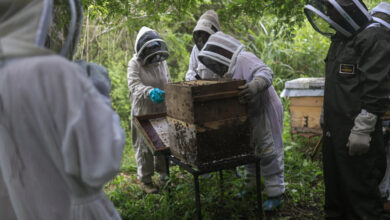Would You Change Your Eating Habits To Consume Insects?
Currently, the sustainability of the livestock sector is being discussed due to the resources needed to produce meat and the emissions generated by farm animals, especially cattle.

The Woman Post | Catalina Mejía Pizano
Listen to this article
The actual demand for livestock products is expected to double from 229 million tonnes to 465 million tonnes in 2050. Beef is considered worse than chicken when it comes to emissions and the amount of grain needed to produce one kilogram of meat. It is worth highlighting that farmed animals including poultry, use up more than 80% of global farmland and emit 60% of agriculture’s greenhouse gases, but yield only 27% of consumed protein. Some people believe that besides the known environmental impact of livestock, it is unethical to raise animals for human consumption. But are there options besides becoming vegetarian or vegan?
Cutting on meat and dairy products is the most effective way to reduce our environmental impact on the planet, but what about those who crave fats and protein? Well, edible insects are becoming trendy since they are sustainable, tasty, and very accessible! It may be new to some of us to eat insects, but it is an important part of the diet in Africa, Asia, South, and Central America. But, why are insects so appealing lately? They grow quickly and efficiently, and they can feed on food that would eventually be wasted. If the environmental concern is not enough motivation to start trying bugs, The Woman Post brings you some additional points to consider:
1. In Case You Didn't Know, You Are Already Eating Bugs
According to a recent study, we are all already eating more than one pound (453g) of insects every year, hidden in other foods. For instance, insect parts can be found in peanut butter, broccoli, canned fruit juices, dates, cinnamon, potato chips, and even on coffee beans. Most fresh plant-based vegetables also contain insect fragments. So why not insects consciously as well?
2. We Can All Benefit From Their Protein Content
The Dietary Intake Report for macronutrients, mentions that a sedentary adult should consume 0.8 grams of protein per kilogram of body weight or 0.56 grams of protein per day. Speaking about protein, would you be surprised to find out that crickets contain up to 69% protein? Also, one single grasshopper has between 14 and 28 grams of protein. They are a complete source of protein containing all the amino acids, plus minerals and vitamins!
Also read: IS CLIMATE CHANGE ALTERING THE BEHAVIOR OF SOME ANIMAL SPECIES?
3. Bugs Are Environmentally Friendly!
As we all know, livestock is not sustainable, since it has a large impact on land use, climate change emissions, water, and air pollution, and freshwater use. On the other hand, insect farming produces approximately 100 times fewer greenhouse gases than beef cattle or pigs! If this weren’t already impressive, farming insects can also help reforestation.
4. They Are Good for You
Besides being rich in protein, edible insects have many other advantages regarding human health. They contain micronutrients such as copper iron, magnesium, phosphorus, selenium, zinc, biotin, and even folic acid which helps the body make healthy red blood cells. They are also a source of monounsaturated and polyunsaturated fatty acids. If you are B12 deficient, they also contain this essential vitamin. It is worth highlighting that B12 helps keep your body’s blood and nerve cells healthy and helps make DNA!
So next time you find a meal that contains bugs, don’t judge it by the looks, eating them could be part of the solution to world hunger and climate change!




